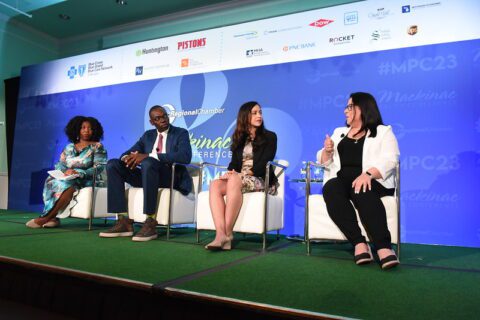- Inclusive policymaking is about sitting with people and letting them guide the solutions.
- Counting is important in order to see how communities are being affected and solve problems.
Have the Courage to Count: How to Bridge Divides With Inclusive Policymaking
May 31, 2023
Key Takeaways
At a time of heightened polarization, the practice of “bridging” through meaningful engagement and community empowerment can improve transparency, build trust, and result in sustainable policy outcomes. This bridge is especially important when seeking solutions to challenges communities face, especially marginalized ones.
According to W.K. Kellogg Foundation’s Michigan Director Faye Alexander Nelson, “People in the communities we serve know best what solutions will work to solve their challenges. Meaningful engagement of groups and individuals can often help us better understand the issues, build stronger relationships, and bridge divides.”
Alexander Nelson provided these remarks during the 2023 Mackinac Policy Conference before diversity, equity, and inclusion (DEI) experts joined a panel moderated by The Associated Press’ Kat Stafford to discuss the importance of community engagement and how investments and policymaking practices can shift from transactional to transformational, focusing on racial equity.
The panel included:
- Garlin Gilchrist II, Lieutenant Governor, State of Michigan
- Celina Barrios-Millner, Co-vice President, Office of Race and Equity Research, Urban Institute
- Isabel Medellin, Global Director, Diversity, Equity, and Inclusion and Talent Acquisition, Steelcase
The Importance of Racial Equity
Lt. Gov. Gilchrist II kicked off the panel discussion, sharing that racial equity in all areas, but especially policymaking, is crucial to Michigan’s advancement and has been a focus of his and Gov. Gretchen Whitmer’s work.
“Giving everyone equitable access to opportunities is how our state will advance and move forward to its highest potential,” said Gilchrist. “[We] have been unapologetic about the fact that the policies and programs in the State of Michigan need to be more equitable.”
He cited the programs and policies they have focused on during their time in office, such as the Michigan Economic Opportunity Fund, which he hopes the private sector will model their own initiatives after.
Barrios-Millner also shared that racial equity is important because it benefits all of us. She used the COVID-19 pandemic as an example, noting how it showed how reliant we are on one another, and when some hurt, everyone is impacted.
“That laid bare both how interconnected we are and how fragile all of our prosperity is,” said Barrios-Millner. “It hit home how much we really need to strengthen those ties across communities and make sure that everybody has access to thrive because it benefits all of us.”
Lastly, Medellin said racial equity is just the right thing to do. Plus, it increases company performance, innovation, and growth, with companies with strong DEI measures outperforming others by 30%.
“Racial equity is like the seeds we need to make our community thrive,” said Medellin. “We need to cultivate and grow that together.”
Using Data to Eliminate Inequities
According to Barrios-Millner, equity is correcting an imbalance, which is why it relies on data – “not perfect data,” she cautioned, “but whatever you have at your disposal.”
“You’re never going to have [perfect data], but you have to have a starting point and know where you’re going,” said Barrios-Millner. “If you don’t have a data-informed approach or a research-informed approach, you might miss the mark [at addressing inequities within your community].”
Gilchrist agreed, encouraging people to count to best observe inequities and see how they affect communities. That’s how he and Whitmer realized there was and addressed a racial disparity during the COVID-19 pandemic.
“It’s important to favor progress over perfection,” said Medellin. “Have the courage to count, have the courage to share some stories, and have the courage to be vulnerable and ask for help. Have a system approach. Have a clear strategy, goals, initiatives, and progress measures. It’s important that we measure things and have clear outcomes so we can arrive at long-term sustainable change.”
This Mackinac Policy Conference session was hosted by W.K. Kellogg Foundation.
